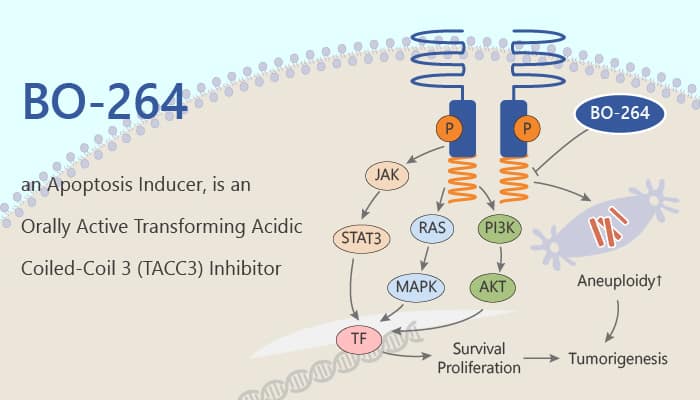Various cancers show elevated levels of TACC3, including prostate cancer, hepatocellular carcinoma (HCC), non-small cell lung cancer and breast cancer. TACC3 is a TACC family member. It plays critical roles in protecting microtubule stability and centrosome integrity. Therefore, TACC3 seems a highly attractive therapeutic target. TACC3 inhibition in breast cancer cell lines reduces cell viability, motility, epithelial-mesenchymal transition (EMT), breast cancer cell stemness. In addition, it also induces apoptotic cell death. Similarly, knockdown of TACC3 suppresses tumorigenesis and cell growth in renal cell carcinoma (RCC) (22), HCC (16), and other cancers. Thus, targeting TACC3 has a strong anti-tumorigenic potential in cancers overexpressing TACC3. In this study, BO-264 is a potent TACC3 inhibitor, with broad-spectrum antitumor activity. It inhibits the proliferation of high TACC3 expressing JIMT-1 breast cancer cells. It interacts with TACC3 by using different biochemical approaches.

BO-264 induces spindle assembly checkpoint (SAC)-dependent mitotic arrest, DNA damage, and apoptosis.
BO-264 induces a prominent increase (from 4.1% to 45.6%) in the fraction of apoptotic cells as assessed by Annexin V/PI staining. It also decreases ERK1/2 phosphorylation, which is a marker for activated FGFR signaling along with a strong mitotic arrest. In addition, it inhibits cell viability with IC50 values of 190 nM, 160 nM, 120 nM, 130 nM and 360 nM for JIMT-1, HCC1954, MDA-MB-231, MDA-MB-436 and CAL51, respectively. BO-264 inhibits the viability of cancer cells with FGFR3-TACC3 fusion with IC50 values of 0.3 μM and 3.66 μM for RT112 and RT4, respectively. Furthermore, it induces mitotic arrest (prominent induces p-Histone H3 (Ser10)), apoptosis (cleaved PARP), and DNA damage. Thus, it causes aberrant spindle formation and reduces centrosomal localization of TACC3 in JIMT-1 cells.
In vivo, BO-264 shows a significant suppression of tumor growth and is well tolerated since treatment does not cause a significant body weight loss and organ toxicity.
In summary, BO-264 is a highly potent TACC3 inhibitor as a novel potential anti-cancer agent, inducing spindle abnormalities, and mitotic cell death.
Reference:
Akbulut O, et al. Mol Cancer Ther. 2020 Mar 26. pii: molcanther.0957.2019.